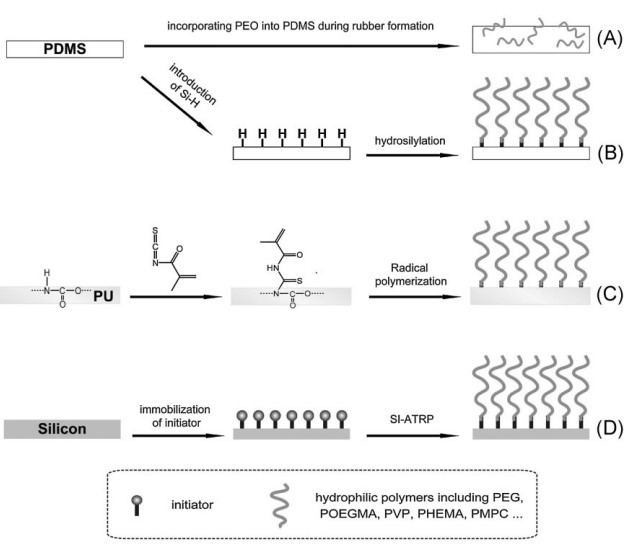As a leader in the protein research field, Creative Biolabs conducts in-depth research on the modification of various proteins. With years of professional experience, we are confident to provide customized services for protein chemical modification and molecular biology modification to ensure that the target protein has the desired properties.
Proteins are vital molecules that participate in a variety of life activities. Protein modifications increase the diversity of protein function. Modification of protein surfaces offers attractive strategies for the redesign of biomolecules. The strategies are advantageous in providing the desired function for the detection, assay, tracking, or targeting of biomolecules. In recent years, surface modification has emerged as an effective tool to fabricate functional surfaces with various features, such as hydrophilicity, charged surfaces, and reactivity.
 Fig.1 Surface modification for reduction of protein adsorption.1
Fig.1 Surface modification for reduction of protein adsorption.1
The function of surface modification is to change the physical and chemical properties of the surface and improve the functionality of the material. In the development of implantable medical devices, the biocompatibility of proteins with specific materials must be evaluated. Protein surface modification of various types of biomaterials ultimately improves the biocompatibility of the materials and interacts as bioactive materials for specific applications.
In general, an ideal reaction for surface biofunctionalization should satisfy the requirements of simplicity and efficiency. Currently, many techniques for the chemical modification of proteins have been developed that allow artificial chemical modification of proteins. The most common functional groups for protein modification are amines, sulfhydryls, carboxylic acids, and hydroxyls. Chemical modification of these amino acid residues is very simple. However, such modifications are generally non-specific and will accompany heterogeneous bioconjugates.
The site-specific modification provides better control for protein labeling and bioconjugation. Furthermore, sulfhydryl-based modification is the most prevalent method for site-specific modification. Site-specific modifications of proteins relying on biophysical probes, cross-linkers, and other reagents play an important role in analyzing protein structure and function. What's more, polyethylene glycol (PEG) plays a crucial role in protein modification due to its excellent solubility and non-toxicity. For example, water solubility can be achieved by covalently attaching PEG to the surface of ferritin. At Creative Biolabs, we offer a variety of conjugation reagents including fluorophores, biotin, and PEG derivatives. In addition, we provide a variety of protein modification services, including but not limited to:
This modification changes the relationship between the structure and function of the protein, affects the formation of protein complexes or the interaction between molecules, and makes the function of the protein more perfect. With strong expertise in the fields of chemistry and biology, our professional scientists focus on providing high value-added services to our clients in a wide range of biomedical fields. Any questions and requirements, please contact us.
Reference
All listed services and products are For Research Use Only. Do Not use in any diagnostic or therapeutic applications.